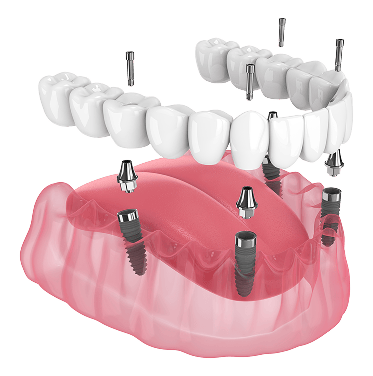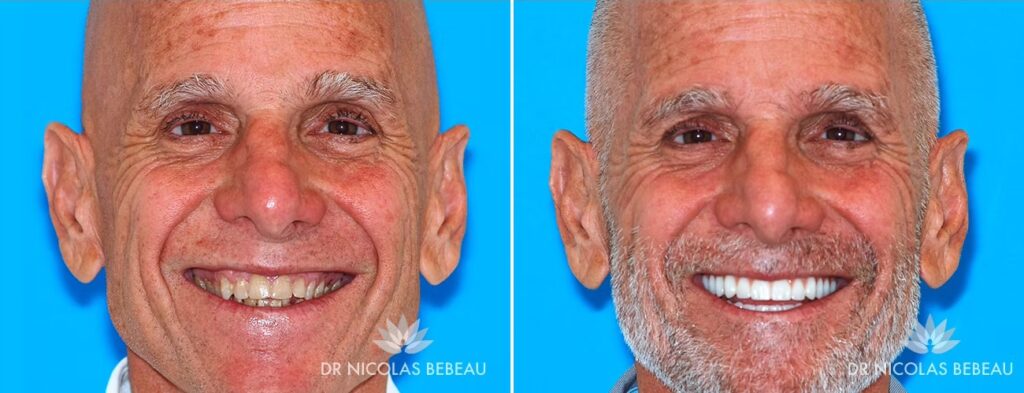Dental Implant Cost Guide
Welcome to Max Implants! The dental implant cost information guide below is for anyone seeking information on the price of dental implants. Please remember, the information provided is a ballpark cost of dental implant treatment. The only way to truly know YOUR cost of dental implants is by scheduling a smile visit with Max Implants. This way, we can walk you through your specific smile and financial situation to give you an exact monthly and all-in cost.
Did you know that you’re not alone? If you’re reading this guide, chances are you are missing some teeth. Right now, there are 120 million people that are missing at least one tooth and 36 MILLION people in America without their entire set of teeth. Just remember, Max Implants is here to help you. You don’t need to be one of these millions of people any longer.

So, let’s start with a question many of you are asking:
Why Are Dental Implant Fees So Hidden?
The real reason is due to three main factors.
- Everybody’s mouth is different and has different needs so what plan might work for person A, might not be a good plan for person B.
- Dentists and implant surgeons use different implant systems that can vary widely in cost. Currently, there are over 160 different types of dental implants on the market. The cheaper the cost of the implant for the implant surgeon, the cheaper cost they can provide you.
- What material is used to make the final teeth? The implant companies that advertise cheap full arch implants use the cheapest materials. The teeth are often made of all acrylic which has limited strength (which can fracture) and is prone to staining with coffee and/or wine.
Cheap dental implants and teeth materials often come with many issues and can be hazardous to your health. The reason they’re cheap is because they use inferior materials and metals which may be subject to breaking, ultimately leading to a shorter long-term lifespan of your teeth. As we all hope, you only want to do this once. Additionally, cheaper materials can lead to poor esthetics, chipping teeth during eating and worse, infections in the jawbone.
In our opinion, nobody should be getting cheap dental implants. The risk is just too high for failure and the need for multiple re-operations. If you want an implant done right, unfortunately, it is going to cost some money. Remember, dental implants are precise, technologically advanced medical devices. We wouldn’t want something implanted in our mouths that’s cheap. We would want something that we know will last and that doesn’t break! So yes, dental implants are considered expensive, but the alternative of multiple procedures and/or infections is much worse. Remember, this is an investment in your body, and you don’t want the cheapest.
So What Kind of Implants Do You Need?
There are two types of dental implant treatments: implants to replace a single tooth or a few teeth, and dental implants to replace all your teeth (the entire jaw or arch). If one tooth goes bad or breaks and you need to replace it, this is called a single tooth implant.
A single tooth implant is made of three separate parts:
- The implant itself – the screw or anchor that goes in the bone
- An abutment – the connector of the screw to the overlying crown or cap
- The crown – the part of the tooth that you see
The general price of a single tooth implant, including all these pieces, is about $3,500-$6,000. Sometimes, this price may get separated into two fees if you have an implant surgeon doing the implant portion ($3,000) and a dentist making the crown portion ($3,000).
Now, let’s talk about options if you’re missing all of your teeth. Your first and cheapest option is the dreaded denture. This is a completely removable set of teeth that is absolutely the least liked option in dentistry. The teeth move, are difficult to chew with, eliminate your ability to taste food and are often incredibly painful. A decent denture should cost between $1,500-$2,500. But we assure you, the price is the only thing you’ll be happy about.
Ok, now let’s talk about replacing all the teeth with implants. This is commonly referred to as full arch implants, the All-on-4® or teeth in a day. They all mean the same thing. In this situation, you are getting four or more dental implants placed in the jaw to replace all your teeth (typically 12 teeth – from the molar on one side to the molar on the other side). This would give you that dream smile and the ability to eat whatever you wanted. These teeth are permanently fixed to the implants and are the closest thing you can get to natural teeth.
Below is one of our patients who received full arch implants. Ron suffered from Sjogren’s syndrome, which is a disease that results in the loss of saliva. Without saliva, we lose the protective barrier in our mouth which often results in tooth decay. Fortunately, Ron was able to eliminate his diseased teeth and get his smile back!

How Long Does it Take to Get My Teeth?
Replacing all the teeth with dental implants is about a six-month process with only one surgery as the first step. The rest of the time is just healing and fine tuning the teeth. Immediately after the first surgery, you are given your first set of teeth called the temporary teeth which you will be wearing for the next four to five months. At no point during this recovery period will you be without teeth! Why the temporary teeth? Because they are light in weight and won’t put strain or stress on the new implants. This is important because it gives the implants the chance to heal. What happens if a lot of weight is put on the implants – they move! And if they move, they’ll fail.
So why does it take so long? Simple answer: biology! It takes time for bones to heal! The American Academy of Orthopedic Surgeons states it takes 12 to 24 weeks for bone to heal. Meaning, once implants are placed in the jawbone, it takes 12 to 24 weeks for those implants to fuse to the bone. There are certain things you can’t speed up, and bone healing happens to be one of them.
So if there are implant companies out there promising you final teeth 24 hours after surgery, beware. This is like pouring the foundation of a house and then building on the foundation the next day. Anyone in construction understands that full curing of concrete takes about 28 days. Building on a soft foundation is the same as giving you the permanent set of teeth too soon. If you build too early, you’re going to end up with problems.
At Max Implants, once the implants have completely healed, which is typically in four months, then you will begin the process of choosing your new teeth. You’ll get to decide the shape and color of the teeth and have multiple trial periods to ensure you are happy.
Now, how much for all this? Advertised costs out there range from $10,000 to $35,000 per jaw. Again, why the split? Because of the materials. A $10,000 per jaw set of teeth means cheaper implants and cheaper materials that are used to make the teeth. This results in teeth that often look fake and are more likely to chip or fracture.
What Material Is Used to Make the Teeth?
At Max Implants, we work with all budgets to design and fabricate the best teeth for your given situation. One thing is for certain, all patients’ first set of teeth will be made of acrylic. As mentioned earlier, acrylic is light in weight and avoids putting stress on your new implants. The upside is that you’ll have a beautiful new smile and the compliments will start flooding in. The downside of the acrylic teeth is that they need to be slightly thicker to avoid fracture and can be prone to staining over time with coffee and/or wine. You’ll be in this set for four to six months.
The final, or second, set of teeth will be made of either zirconia or acrylic with an inner titanium bar for strength. This will be dependent on each individual case and budget. These teeth look beautiful and have the strength to eat the foods you’ve been dreaming of. Steak, yes. Apples, yes. Nuts, yes.
So Who Does My Surgery?
 At Max Implants, Dr. Nicolas Bebeau is the implant surgeon. He is a board-certified Oral and Maxillofacial Surgeon, having performed over 2,500 All-on-4® procedures and placed over 10,000 dental implants in his career. He holds two degrees—both a medical degree (MD) and a dental degree (DDS)—a distinction that required an extra six years of advanced surgical training beyond dental school. He also served over 10 years at a Level-1 trauma center in the Valley, performing numerous extensive facial and jaw reconstructions for injuries ranging from motor vehicle collisions to gunshot wounds.
At Max Implants, Dr. Nicolas Bebeau is the implant surgeon. He is a board-certified Oral and Maxillofacial Surgeon, having performed over 2,500 All-on-4® procedures and placed over 10,000 dental implants in his career. He holds two degrees—both a medical degree (MD) and a dental degree (DDS)—a distinction that required an extra six years of advanced surgical training beyond dental school. He also served over 10 years at a Level-1 trauma center in the Valley, performing numerous extensive facial and jaw reconstructions for injuries ranging from motor vehicle collisions to gunshot wounds.
As far as implant surgeons go, the only person you should allow to do the All-on-4® is a board-certified Oral and Maxillofacial surgeon. Why an Oral and Maxillofacial Surgeon? Because this procedure is not easy and complications from poor implant placement happen.
Does Health or Dental Insurance Pay for This?
Unfortunately, insurance does not pay for this type of treatment. Both medical and dental insurance companies don’t view full mouth implant therapy as approved coverage. But don’t be discouraged. The team at Max Implants will work with you to create a monthly and all-in cost that fits your life. This is an investment in yourself and we are here to help. Fill out the form below to get started or visit this page to schedule a virtual consultation.

